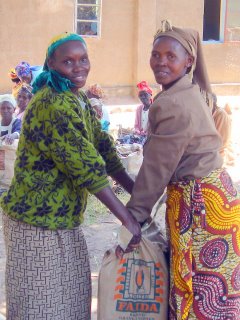 Mr. Kisu, an elder in the Kenya Evangelical Lutheran Church (KELC), beams a smile as he calls out another name. He is not the only one smiling. A woman rises, presenting her ID before stepping over to the stacks of flour packets. Three women, chosen by the community to distribute the relief food, hand the woman her family’s share.
Mr. Kisu, an elder in the Kenya Evangelical Lutheran Church (KELC), beams a smile as he calls out another name. He is not the only one smiling. A woman rises, presenting her ID before stepping over to the stacks of flour packets. Three women, chosen by the community to distribute the relief food, hand the woman her family’s share.This week villages across Ukambani district outside Machackos, Kenya, including 800 families today, will receive 24 kilos of corn flour through KELC with funds provided through Action by Churches Together (ACT) and Church World Service. The church targets the neediest families, including orphans, widows, the elderly and poor, regardless of religious affiliation, to ensure the most needy receive food until the rains return.
 Pastor Chambi and two church committee members observe the distribution from a distance. With weekly offerings of US$15 or less, he cannot help many people who seek assistance but today is different. Seeing these food donations makes his robust arm movements more expansive, as he emphasizes, “It doesn’t help to just give them something, but to teach them how to use it.”
Pastor Chambi and two church committee members observe the distribution from a distance. With weekly offerings of US$15 or less, he cannot help many people who seek assistance but today is different. Seeing these food donations makes his robust arm movements more expansive, as he emphasizes, “It doesn’t help to just give them something, but to teach them how to use it.”Originally from Tanzania, Rev. Chambi preaches a self-reliance and communal gospel, where those suffering individually come together to discuss their problems. As he explains, poverty is “bait” to get people thinking about real, long-term solutions. In preparing for the future, he has trained his members to build churches and store grain. By teaching them certain skills, the pastor empowers the people to be self-reliant and fight poverty. Declares Rev. Chambi, “I want to go somewhere, but I don’t want to arrive there alone.”
 He watches as another single mother passes, stooping under her received unga (flour). A member of Salvation Army, Sarah Nzuki has five children and walked 3 km today to receive her rations. While the food is only enough for one week, she is happy and extremely grateful to have more time to spend on productive activities such as growing and selling mangoes.
He watches as another single mother passes, stooping under her received unga (flour). A member of Salvation Army, Sarah Nzuki has five children and walked 3 km today to receive her rations. While the food is only enough for one week, she is happy and extremely grateful to have more time to spend on productive activities such as growing and selling mangoes.Grace Mumo of KELC also passes by on her way to receive food. She and her daughter Dorcas live alone due to community stigmatization of their HIV positive status. In this area, AIDS is a badge of shame. In “a culture of secrets,” many people die alone with the disease, she says, and the community often tries to silence her when she speaks out. Grace finds support from an ecumenical group living with AIDS and continues to educate others about the disease.

Pastor Chambi with Mama Nzuki
Pastor Chambi is very pleased with distribution, managed in a “natural and relaxed manner with no haggling.” The pastor attributes this to self-selected distribution by women, church reverence, open accountability and specifically targeting the needy. With the food on open display, the community provides an excellent model for the church in working together. Today the church is a source of present and future hope, as the faithful distribute food to those in need.


No comments:
Post a Comment